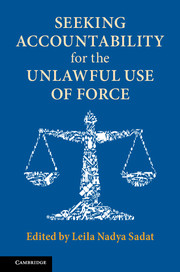Book contents
- Frontmatter
- Dedication
- Contents
- Notes on Contributors
- Foreword
- Preface
- Table of Cases
- Introduction
- PART I HISTORIC AND CONTEMPORARY PERSPECTIVES ON THE UNLAWFUL USE OF FORCE
- PART II MECHANISMS FOR RESTRAINING THE UNLAWFUL USE OF FORCE AND ENHANCING ACCOUNTABILITY
- PART III THE ILLEGAL USE OF FORCE AND THE PROSECUTION OF INTERNATIONAL CRIMES
- PART IV IMAGINING A BETTER WORLD
- 17 Rethinking the Relationship Between Jus in Bello and Jus ad Bellum: A Dialogue Between Authors
- 18 Twenty-First Century Paradigms on Military Force for Humane Purposes
- 19 The Presumption of Peace: Illegal War, Human Rights, and Humanitarian Law
- 20 The Urgent Imperative of Peace
- Epilogue
- Index
20 - The Urgent Imperative of Peace
from PART IV - IMAGINING A BETTER WORLD
Published online by Cambridge University Press: 21 May 2018
- Frontmatter
- Dedication
- Contents
- Notes on Contributors
- Foreword
- Preface
- Table of Cases
- Introduction
- PART I HISTORIC AND CONTEMPORARY PERSPECTIVES ON THE UNLAWFUL USE OF FORCE
- PART II MECHANISMS FOR RESTRAINING THE UNLAWFUL USE OF FORCE AND ENHANCING ACCOUNTABILITY
- PART III THE ILLEGAL USE OF FORCE AND THE PROSECUTION OF INTERNATIONAL CRIMES
- PART IV IMAGINING A BETTER WORLD
- 17 Rethinking the Relationship Between Jus in Bello and Jus ad Bellum: A Dialogue Between Authors
- 18 Twenty-First Century Paradigms on Military Force for Humane Purposes
- 19 The Presumption of Peace: Illegal War, Human Rights, and Humanitarian Law
- 20 The Urgent Imperative of Peace
- Epilogue
- Index
Summary
INTRODUCTION
When and under what conditions States may lawfully employ force currently preoccupies government decision makers, academics, journalists, and policy makers. As war in Syria rages, the seemingly endless conflicts in Afghanistan and Iraq metastasize into new forms of violence, North Korea threatens Seoul and the United States by launching and testing nuclear-armed missiles, the 45th U.S. President threatens “fire and fury like the world has never seen” in response, ISIS-affiliated individuals launch deadly attacks against civilians in European capitals, increasing number of incidents involving naval forces are taking place in the South China Sea, and Russia invades and annexes portions of Ukraine, there is growing concern that the Post–World War II international legal order is under terrible stress.
This unease is exacerbated by positions taken by the United States government and many in the academy, where distinguished scholars have announced the “death” of Article 2(4) of the U.N. Charter prohibiting the use of force, and war-talk has become so normalized that prominent academics like Rosa Brooks have suggested that human rights lawyers insisting upon clear distinctions between war and peace (under the jus ad bellum) and well-established applications of the laws of war (the jus in bello), are “wast[ing] time and energy” and engaging in “self-deception” because “events march inexorably on.” Instead, she suggests that we should “develop laws, politics, and institutions premised on the assumption that we will forever remain unable to draw sharp boundaries between war and peace, and that we will frequently find ourselves in the space between.” A space between that allegedly constitutes the new normal – a normality based upon the Colossus that is the American military and its “war” against terror, which, in the views of some, is unlikely to diminish over time.
This thesis, and the assumptions that underlie it, causes others to believe that the “greatest threat to world peace today is Washington's imperial power.” And this power is formidable. The United States spent close to 36 percent of the global total of military spending, and in terms of arsenal, has more nuclear weapons, aircraft carriers, and intelligence capabilities than the rest of the world combined.
- Type
- Chapter
- Information
- Seeking Accountability for the Unlawful Use of Force , pp. 548 - 577Publisher: Cambridge University PressPrint publication year: 2018

